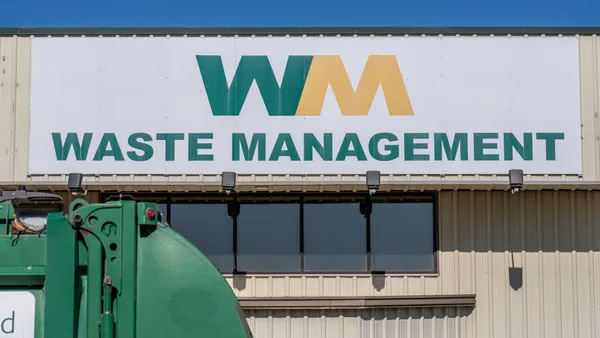Dive Brief:
- A plan to deprivatize residential waste collection in multiple parts of Kansas City, Missouri stalled in a 4-4 city council committee vote on April 24, The Kansas City Star reported. Service in these areas has been handled privately since the 1970s.
- Kansas City's Solid Waste Division estimates this plan could yield about $20 million in savings over 10 years. The city currently spends an estimated $7.2 million (out of a $21.9 million solid waste budget) for a WCA Waste Corporation subcontractor to collect in these areas. Annual costs are expected to rise by $3.5 million when that contract expires in 2020.
- Rising costs and customer complaints spurred council members to ask the city manager for a potential plan to deprivatize in February. Municipal crews already handle collection service in other areas of the city. However, some council members remain unconvinced that a broader public takeover would actually reduce costs due in part to the upfront capital expenses required.
Dive Insight:
Kansas City's potential to walk away from a private company in favor of municipal service may appear contrary to recent decades' larger national trend of municipalities contracting out some or all of their collection needs. The NWRA is a strong proponent of privatization, saying it can save municipalities money and time — especially when it comes to managing fleets — and potentially improve safety.
"This in turn allows governments to focus their limited resources on core services such as recycling education, first-responders, education, and infrastructure," reads one association talking point.
The central part of the city, about an 8-mile section south of the Missouri River, is currently handled by municipal crews. While officials say expanding that practice will be a cost saver in the long term, the upfront costs are still notable. The city estimates it would have to hire close to 80 new employees (no simple task amid a tight labor market) and purchase upward of 24 new trucks — all before the current contract expires on May 1, 2020. Recycling collection is under private contract until 2024 and would not be affected by this change.
The city has also promised to expand service for bulky waste and yard waste, as well as "enhance neighborhood cleanup programs," if it makes the switch.
Supporters of the plan in Kansas City seem intent on moving things forward. Service complaints are said to be on the rise, with a reported 22% decrease in satisfaction since 2015 according to a recent survey of residents. Of the top eight searches on the Kansas City government website, five have to do with waste, recycling or trash pickup as of April 29. It appears clear that Kansas City residents are engaged with their service and may be ready for a change — but what that change will look like remains unclear.
City staff are expected to report back to council members next month with more detailed financial information. A case being made for savings — even with added expenses such as salaries, equipment and fuel — could change the calculus and inspire Kansas City to buck national privatization trends.









